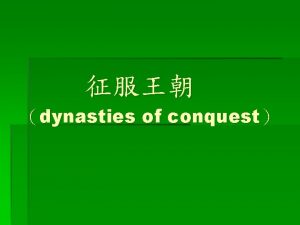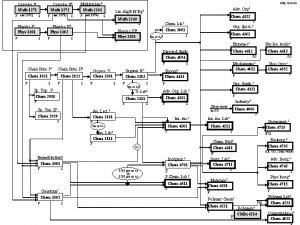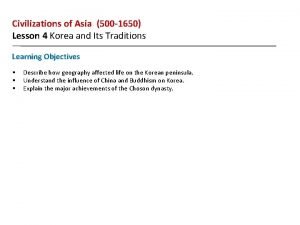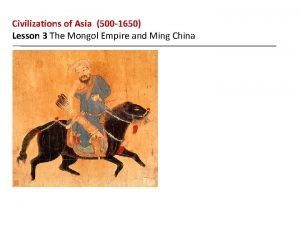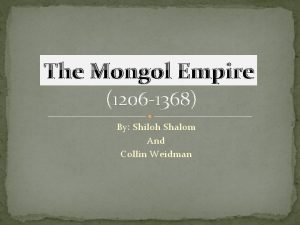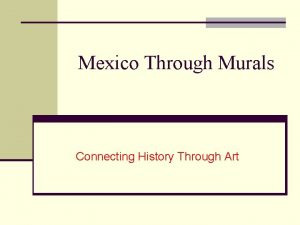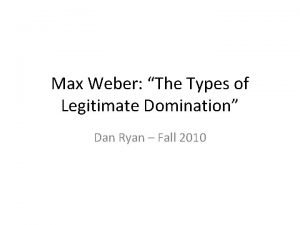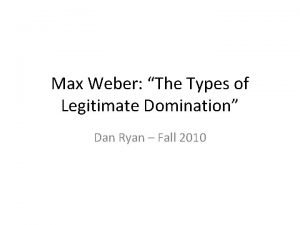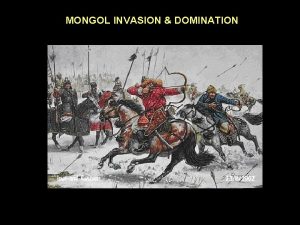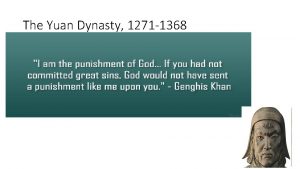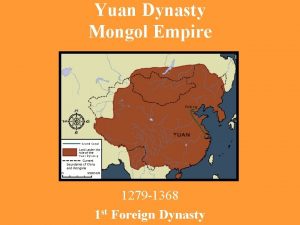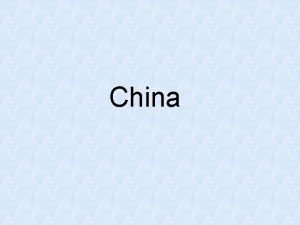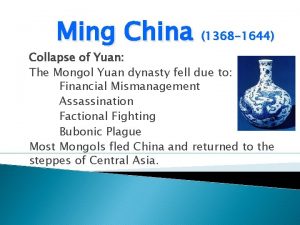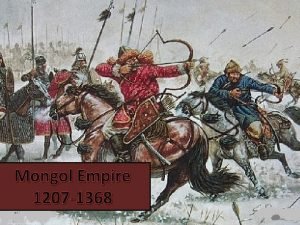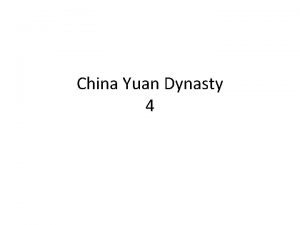Mongol Domination in China 1271 1368 The Yuan










- Slides: 10

Mongol Domination in China, 1271– 1368

The Yuan Empire, 1279– 1368 • Khubilai Khan understood and practiced Chinese traditions of government. • He constructed a Chinese-style capital at Beijing and a summer capital at Shangdu, where he and his courtiers could practice riding and shooting. • China was politically fragmented, consisting of three states: the Tanggut, the Jin, and the Southern Song. • The Mongols permanently reunify China.

Mongol Additions to Chinese Government • These included tax farming, the use of Western Asian Muslims as officials, and a hierarchical system of legally defined status groups defined in terms of race and function. • Under the Yuan hierarchical system Confucians had a relatively weak role, while the status of merchants and doctors was elevated.

China’s Prosperity • Under Mongol rule China’s cities and ports prospered, trade recovered, and merchants flourished. • Merchants organized corporations in order to pool money and share risks. • Cities were populated where a lively urban culture of popular entertainment, vernacular literature, and the Mandarin dialect of Chinese developed.

Population Decline • During the Yuan period China’s population declined by perhaps as much as 40 percent, with northern China seeing the greatest loss of population, while the Yangzi Valley actually saw a significant increase. • Possible reasons for this pattern include warfare, the flooding of the Yellow River, north-south migration, and the spread of diseases, including the bubonic plague in the 1300 s.

The Fall of the Yuan Empire • In 1368 the Chinese leader Zhu Yuanzhang overthrew the Mongols and established the Ming Empire. • The Mongols in the west and Central Asia still posed threates to the Ming, along with the Jurchens of Manchurians in the North East

The Early Ming Empire, 1368– 1500 Ming China on a Mongol Foundation • Zhu Yuanzhang made great efforts to reject the culture of the Mongols • He also tried to close off trade relations with Central Asia and the Middle East, and to reassert the primacy of Confucian ideology • He did keep Beijing (Forbidden City) as a capital, the Mongol calendar and other governmental aspects of Mongol culture.

Exploration and Trade • Between 1405 and 1433 the Ming dispatched a series of expeditions to Southeast Asia and the Indian Ocean under the Muslim eunuch admiral Zheng He. • The goals of these missions were to reestablish trade links with the Middle East and bring Southeast Asian countries and their overseas Chinese populations under Chinese control, or at least under its influence. • Established Tributary states. • However, there was not significant increase in long-distance trade and the voyages were, overall, not profitable.

Voyages End • The end of the Zheng He voyages may also be related to the need to use limited resources for other projects, including coastal defense against Japanese pirates and defense of the northern borders against the Mongols. • The end of the Zheng He voyages was not the end of Chinese seafaring: it was only the end of the state’s organization and funding of such large-scale expeditions.

Technology and Population • The Ming saw less technological innovation than the Song • In the area of metallurgy, the Chinese lost the knowledge of how to make high-quality bronze and steel • Korea and Japan moved ahead of China in technological innovation. • Korea excelled in firearms, shipbuilding, meteorology, and calendar making, while Japan surpassed China in mining, metallurgy, and novel household goods
